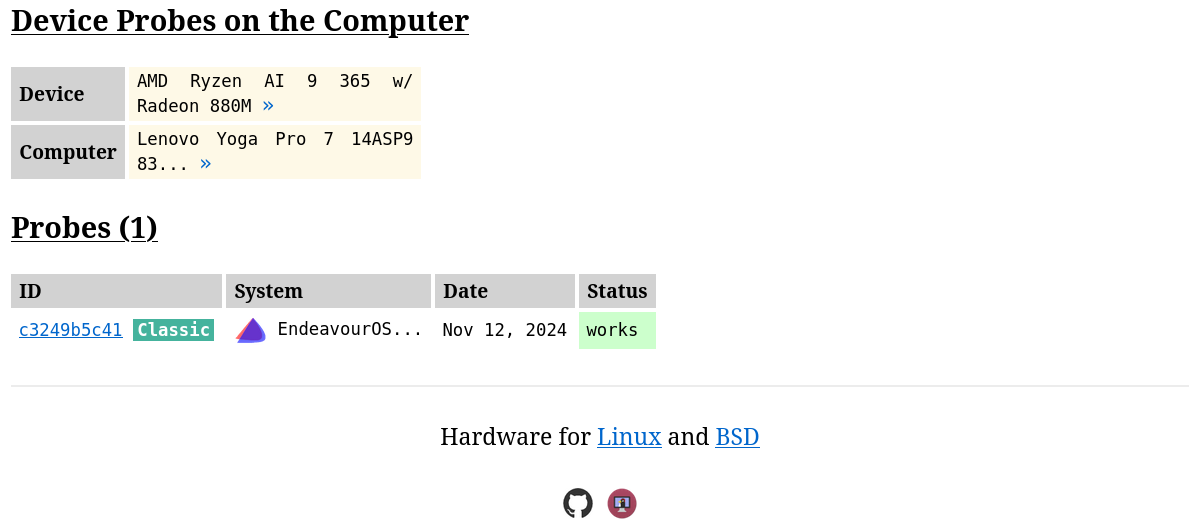cross-posted from: https://lemmings.world/post/17893006
I am in the market for a new laptop. I have searched quite a lot and decided to go with Lenovo. I am connected to mains most of the time and I am looking for compute power over efficiency. So the new Intel Lunar Lake 258V processors are not for me. That means Zenbook S14 is out of discussion. Also before anyone push a Framework plug, No! Framework laptops are not available where I live.
Its for my personal use and my preferred setup is Gnome on EndeavourOS. and its mainly used as a media consumption device. But occasionally it could run
ffmpegh265 encoding, run one or two moderately heavypodmancontainers (like Jellyfin) and sometimes a 6GB RAM VM or a local LLM model (3b) (very rare).Basically I have narrowed it down to two laptops:
- Lenovo Yoga Pro 7 Gen 9 (14, AMD) - AMD Ryzen AI 9 365 (Preferred)
- Lenovo ThinkPad P14s (AMD) Gen 5 - Ryzen 7 PRO 8840HS
With Yoga Pro 7 being my preferred pick. When similarly specked with 32GB RAM, both are almost similarly priced, with Yoga running about $200 extra. I feel that new ThinkPads are a little overpriced for what they offer, at-least where I live.
- Yoga has the new AMD architecture (Zen 5).
- Yoga’s screen is better than ThinkPad’s (2.8K OLED @ 120Hz vs FHD IPS @ 60Hz, OLED option is not available for ThinkPad here).
- Yoga has an Aluminum build. I haven’t used ThinkPads in the past, but had a plastic Dell Latitude in the recently (2022) and its build quality and plastics were really bad. Currently I have an Aluminum built laptop (from 2018) and its so much better than Dell’s.
- I prefer the aesthetics of Yoga over ThinkPad (Though its subjective).
- ThinkPad is a bit cheaper (by $200) and upgradable.
Yoga Pro 7 Gen 9 (14, AMD) being very new, I don’t know about its Linux (EndeavourOS) compatibility.
Does the new Ryzen AI 9 300 series work well with Linux? This is the only linux-hardware.org probe for this laptop.
Yoga Pro 7 Gen 9 (14, AMD):
On the other hand, the ThinkPad P14s (AMD) Gen 5 works well with Arch with Ryzen 7 PRO 8840HS. This puts me in a dilemma, should I spend a little more and for the not heavily Linux tested, but new Strix Point (Ryzen 300 series) Yoga Pro 7 or go for a tested Ryzen 7 PRO 8840HS ThinkPad?
I am planing to keep my laptop for 5-6 years.
If anybody have the new gen AMD processor Laptops running Linux (Any Distro) please share your experience.
That name is a mouthful.
What, you don’t think Strix Point AMD Ryzen AI 9 365 Yoga Pro 7 is easy to say? Which part of Strix Point AMD Ryzen AI 9 365 Yoga Pro 7 do you dislike so much? If anything Strix Point AMD Ryzen AI 9 365 Yoga Pro 7, or how I like to call it, SPARA9365YP7, flows pretty well, as far as I’m concerned.
I know, they are trying to put AI label on everything.
I think it’s still a mouthful even without the AI in there. I genuinely thought the name was satire to begin with…
The Strix Point is the code name for this generation of CPUs from AMD. Earlier gen was Hawk Point.
The zen 5 chip should work fine if you’re on kernel 6.8+ (which is when zen5 IDs were introduced), but you might have some poor battery life. Here are some testimonials from folks who ran 6.11 on it and it performed well.
The note about enabling the
amd_pstatedriver was interesting, evidently it was not default in my system! The “guided” mode seems great.A couple added notes after rereading your post:
- Linux shouldn’t care about the specific laptop, you might want to try searching for the 365 SOC instead, that ought to give you more info.
- Strix Point should give you substantially better compute power and efficiency than the 8000 series, so you can have your cake and eat it too.
- on a reliability note, I recommended a Yoga to a friend a couple years ago, and within a year the hinge broke and shattered the screen. She now has a thinkpad, which is a lot more durable.
This is getting ridiculous. Just when I thought I somewhat understood AMD’s CPU lineup, I came across their new Ryzen 9000 series, launched a month after their AI 300 series release. I mean what is the point of having two lineups of CPUs?
AFAIK 9000 is desktop, AI is laptop. But the naming gets worse! Their new laptop chip coming out in a couple months is the “Ryzen AI MAX+ Pro 395”. It’s horrifyingly bad naming.
AMD’s marketing department is king of ruining a brand.
I have no personal experience, but I’ve heard rumors that hybrid architecture (performance cores + efficiency cores) doesn’t work well with linux.
That might be completely outdated or only relevant for Intel. But maybe it will help if you look into that in more detail.
They recently added support for this in the kernel for AMD cpu cores, so this might have changed.
I bought an Ideapad Slim 7 Carbon (sold as yoga in other markets and looks identical to the Yoga Pro 7 you mention) for its beautiful screen, similar to your Yoga option but only 90hz, and its thin and light body a couple of years ago. The OOB experience in Windows was great (for Windows) and it’s been mostly good in Linux. I needed to replace its m.2 wireless card for compatibility reasons, battery life is very short in Linux, and the speakers don’t function - the firmware on the device doesn’t adequately identify its audio hardware so that the Linux kernel can make use of its built-in amplifier.
Ideapads don’t get the same Linux support as Thinkpads, so there’s been no help from Lenovo. You may be in the same boat with a yoga. Even Cirrus (the makers of the amp) tried to update their drivers but couldn’t do anything with what Lenovo makes accessible in its firmware.
Maybe newer models have improved in this regard. If I knew the speakers would be an intractable problem when I was shopping I wouldn’t have bought it.
It’s a hybrid device - AMD processor with Nvidia GPU - which is a hassle. I couldn’t get it to work properly myself, wound up going with a gaming distro (Nobara) to deal with it. It’s mostly fine. It also doesn’t shut down. I assume some bios setting I don’t have access to is not interacting well with the way Linux shuts down. There are minimal bios settings available to manipulate (because Ideapad’s are not considered power-user devices).
Build quality of the laptop itself is also mostly good, though the keyboard is on the flimsy side. My ‘c’ key’s switch broke in a way that can’t be repaired so it occasionally pops out of place. That started about a year in.
…While it might lower gaming performance, have you tried
tlp?Yep! I mean, it’s been two years now. I’ve tried TLP, Powertop, and both combined.
They improve things but I still only get about 5 hours, half the battery life I did in Windows 11. I’ve accepted these downsides because I already have the laptop and can’t just go buy a new one, but a device with proper Linux support has real upsides.
Have you tried configuring the
amd-pstatedriver in GRUB? That helped me a fair bit with battery life, though having an ROG laptop also meant I was already usingasusd, which tripled my battery life just by having reasonable fan and power level settings. I hadn’t had any luck with TLP either.








